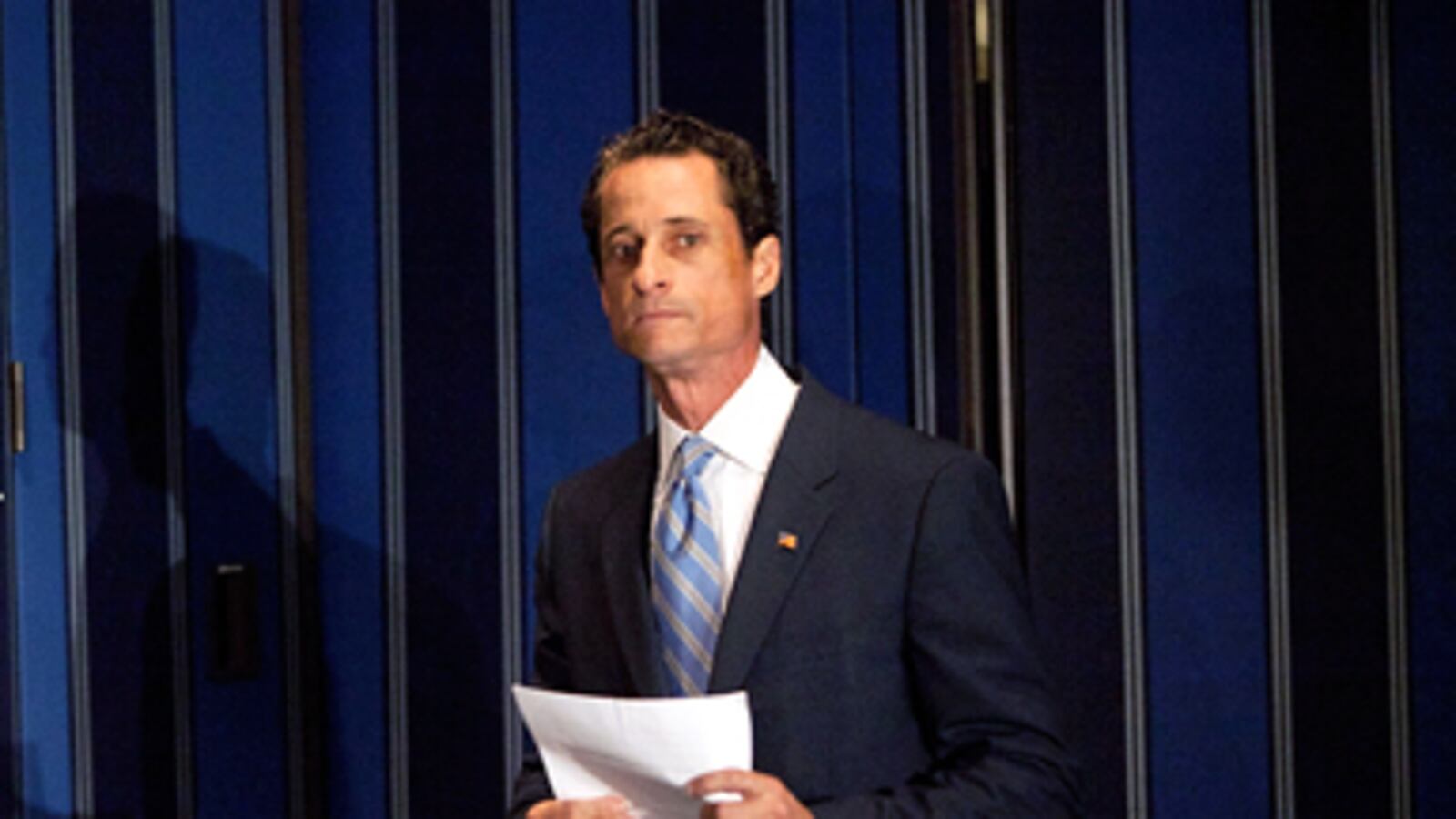Just as conventional wisdom was starting to conclude that the Democrats might have a serious chance of winning back the House in 2012, Nancy Pelosi gets hit with the Anthony Weiner revelations. She immediately called for an ethics investigation because she had to—she was staring at days of stories in which she’d be asked why she hadn’t made such a demand (an experience she lived through with regard to Charlie Rangel). But Pelosi has another potential problem that no one has yet focused on: holding on to Weiner’s district.
That’s right. Everyone hears “New York City congressional district” and thinks automatically that it has to be solidly Democratic. Most of them are. On Hardball Monday night, Chris Matthews ventured that Weiner’s district had to be “90 percent” Democratic.
Uh, not really. Welcome to the difference between Manhattan and the outer boroughs. In 2010, Weiner beat a relative unknown named Bob Turner, a retired television executive who raised a lot of money (more than $300,000) for a challenger to an established incumbent, by 60 percent to 40 percent. That’s a blowout by normal standards, but by the standards of congressional districts that are carved to protect incumbents, it’s a pretty close shave. To be sure, 2010 was an unusual year: GOP turnout was goosed in Weiner’s district just as it was across the country. In other years, Weiner has waltzed to reelection, not even drawing a Republican opponent in 2006 and 2008. But when a multi-term congressional incumbent has an opponent who hits 40 percent, insiders notice.
It’s just not that heavily Democratic a district in voting terms. Its Cook partisan voting index is just D+5. By comparison, Rangel’s Harlem district is D+41, and Carolyn Maloney’s East Side/Queens district D+26. So D+5 is not such a heavy advantage at all—provided there’s a credible Republican around. Well?
There’s Turner, who could make another run. And there’s Eric Ulrich, a Republican member of the New York City Council whose district overlaps in considerable measure with the Queens portions of Weiner’s. At 26, Ulrich is just barely constitutionally old enough to be in the House (you have to be 25). He does already have a proven ability to get Democratic votes. His council district is three-to-one Democratic, and he won it in November 2009 over the Democratic nominee by 20 points.
George Arzt, a Democratic political consultant in the city, speaks well of Ulrich. “Koch loves him and would support him,” Arzt says of Ed Koch, his one-time boss (Arzt was Hizzoner’s press secretary). A 71 percent white district in Brooklyn and Queens, heavily Jewish with Italian and Irish populations, is the kind of district where Koch’s word can still matter. So, depending on how bad things get with Weiner, it’s not at all impossible to imagine either of these Republicans beating him. With the Democrats trying to count up to the 24 that would put them back in the majority, that would be a seat they sure weren’t counting on losing.

But the reality is that Weiner probably won’t make it to 2012. He might not make it to next week. But let’s assume for the moment that he does. Before he runs into a 2012 opponent, he’ll run into the chainsaw called redistricting.
New York, like every other state, is drawing new congressional districts in time for the 2012 elections. The state is losing two seats. The handshake between the parties has long been that they’ll agree to combine two upstate Republican districts into one, making two GOP incumbents run against each other there; and that they’ll do the same to two Democrats downstate.
In my talks with New York politicos over the years, the thinking had long been that the Democratic match-up might be between Maloney and Jerry Nadler, who represents the West Side of Manhattan and parts of Brooklyn. More recently, I’m told, some focus has been on Carolyn McCarthy, whose district straddles Queens and Long Island.
But now? Weiner—not well liked, to put it mildly, by his fellow pols to begin with—has just handed the state legislature a pretty compelling reason to disfigure his district beyond any recognition. It’s long been known that Congressman Joe Crowley, who is a Queens guy but whose district runs up into the Bronx, wants more of the old Queens nabes back. I’m betting Crowley is a smiling fellow today.
Finally, of course, Weiner might not make it even that far. The conventional wisdom seems to be that there are more beans to be spilled, and he’ll have to resign. In that case, according to the New York State Board of Elections, Governor Andrew Cuomo will call a special election, which must be held within 40 days. The party organizations of the counties involved (Brooklyn and Queens, since the district straddles both) will choose their nominees. Turner and Ulrich both told me Tuesday they’d be very interested in running in a special election. I’d imagine the national GOP would be rather interested in putting hundreds of thousands of dollars behind the nominee. A GOP win would be a long shot, but if it happened, it would constitute an earthquake.
Some of the things Anthony might have thought about...






